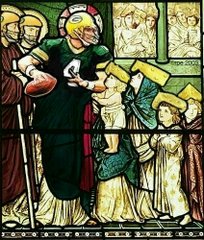God is love, and he who abides in love abides in God, and God in him. Love has been perfected among us in this: that we may have boldness in the day of judgment; because as He is, so are we in this world. There is no fear in love; but perfect love casts out fear, because fear involves torment. But he who fears has not been made perfect in love.
We love Him because He first loved us. If someone says, "I love God," and hates his brother, he is a liar; for he who does not love his brother whom he has seen, how can he love God whom he has not seen? And this commandment we have from Him: that he who loves God must love his brother also. 1 John 4:13-21 nkj
Dearly beloved of God,
Today’s epistle is a most difficult and dangerous text to preach properly. It is an exhortation to love one another as we abide in faith in Christ.
The difficulty and danger both lie in presenting the importance and even necessity of loving one another without making it appear that our loving one another in any way earns God’s favor or satisfies His requirements to enter heaven.
There is an episode from the Simpson’s that presents this danger in a cynical and exaggerated example that may set our teeth on edge, yet captures the truly diabolical message that lies beneath looking to our own good works for salvation. In this episode Homer poses as a missionary on a tropical island. As Homer enjoys the good life he brings "Christianity" to the native population and supervises the building of a mission church. His message – "Pick up a rock (to build the church) or go to hell."
Of course the message is rarely, if ever, so crass in real life. It is more likely to be something like, "If you’re not nice, God will be mad at you." Or, "Don’t you want to make God happy?" Or, "If you really believed you wouldn’t behave so badly." Or, "If you had any faith and really loved God you would tithe and our church wouldn’t have any problems." But the underlying message is the same, if you do not love and do enough things for God and other people God will not be pleased with you and you cannot get to heaven.
Of course it is true, we cannot get to heaven unless God is pleased with us. But here is the rest of that truth – for the sake of His Son, Jesus Christ, and what He has done for us – God is pleased with us and we have already been taken to heaven in our Baptism.
Yet sadly, even preaching it rightly does not guarantee it will be rightly heard.
Decades ago, a comprehensive survey of active Lutherans showed that, even among a church body that is founded upon salvation by grace through faith in Christ alone, 75% of her active members, when asked about why they thought they would go to heaven, responded with answers that relied upon their own good works to get them there!
Answers to the question, "When you die, are you sure you will enter heaven?" most often take the following form:
"I hope so. After all I was president, I tithed, I sang in the choir, I taught Sunday school, I never miss a Sunday unless I am sick." etc.
As almost any Lutheran who has gone door to door in evangelism efforts over the years will confirm, this is not an unusual percentage. Sadly, even many within our own church body adopt evangelism and stewardship programs reminiscent of the Homer Simpson claim – i.e. if you don’t grow God’s church people will go to hell and the church will die.
All of this does not mean the message to love one another should not be preached -- only that the pastor be careful to do so rightly and leave the right hearing and reception of the Word to the Holy Spirit, who accomplishes all things according to the Father’s will by the preaching and hearing of the Word – How then shall they call on Him in whom they have not believed? And how shall they believe in Him of whom they have not heard? And how shall they hear without a preacher? And how shall they preach unless they are sent? As it is written: "How beautiful are the feet of those who preach the gospel of peace, Who bring glad tidings of good things!" But they have not all obeyed the gospel. For Isaiah says, "LORD, who has believed our report?" So then faith comes by hearing, and hearing by the word of God. [Rom. 10:14-17]
Make no mistake about it, only God’s love for us in Christ received through faith worked by the Holy Spirit in the proclamation of the Word saves anyone or grows His church– which is precisely the reason preaching today’s text is so difficult.
John’s words from last week’s epistle are helpful , and indeed necessary, if today’s epistle is to be preached, received, and applied correctly and faithfully: "In this is love, not that we loved God, but that He loved us and sent His Son to be the propitiation for our sins. Beloved, if God so loved us, we also ought to love one another." [1 John 4:10-11]
The words of today’s Epistle reading and text from 1 John remind us that our claim to love God (or as James says, our faith) is empty if we do not also love one another. The two go together. We love because He first loved us, and our love shows itself in words and deeds of kindness to each other.
Yet herein lies another difficulty, the world of unbelief is full of apparent acts of love and kindness. This is most especially evident as we observe Memorial Day and the lives sacrificed by patriotic Americans for love of country and fellow citizens. These great deeds are beneficial to people and society, and to be received with thanksgiving as gifts from God. Yet, as great and beneficial as they are, they do not identify one as a Christian or earn a place in heaven for those who do them.
The love and kindness of faith is defined by forgiveness.
Our text recalls John’s Gospel that Christ is the vine and we are the branches. He who abides in Him will bear much fruit. It defines the fruit by which branches of the true vine, Jesus, are known – that we love each other as God has loved us. And how has God loved us? By dying to forgive us.
"This is My commandment, that you love one another as I have loved you. Greater love has no one than this, than to lay down one's life for his friends. You are My friends if you do whatever I command you." [John 15:12-14 nkj]
Only Christ’s shed blood saves and gives eternal life. So Jesus is not telling us here to physically give up our life as a sacrifice for anyone’s sins. That would be blasphemy and denial that His death was and is sufficient for us. "It is finished." Salvation is won! Eternal life is a done deal, a dead lock cinch, a certainty no one can take away from you or anyone who is kept by the Holy Spirit with Christ in faith.
So today’s text doesn’t tell us what to do in order to be saved. It tells us what the faith of those who have already been saved looks like. When we die to sin in Baptism we are raised to live a life of forgiveness toward our brothers in Christ, and even to all the world. This is the unique work of every Christian even as each of us is given differing gifts and vocations to perform.
And yet look at how we so often hold grudges against one another for the smallest of things.
Nothing will kill a congregation more quickly and certainly than lack of love toward each other – especially in refusal to forgive one another the grievances that are bound to occur wherever two or three sinners are gathered together. Even when the gathering is around Christ and His name, sinners still bring their own baggage along with them.
But though congregations may suffer -- as we see in the case of the Corinthians who are not loving one another even as they come to the Lord’s Supper, and even in our own case as we are just as likely to complain about how someone serves in their elected or appointed congregational offices or duties as we are to thank them for serving. And though individual congregations may even cease to exist because of such lack of love for one another, still the Church of Christ will never perish. Why? Because the church of Christ is built not on our imperfect love for one another, but on the perfect love of the only begotten Son of God.
So while loving each other means forgiving all kinds of behavior that hurts and offends us personally, any teaching or behavior in the congregation (that is, the localized gathering of believers around the name and Word of God) that would in any way point to any one or anything but Christ for our salvation is to be avoided, confronted and cast out from among us. As Christ’s apostle, Paul, tells Pastor Timothy: "Take heed to yourself and to the doctrine. Continue in them, for in doing this you will save both yourself and those who hear you." [1 Tim 4:16 NKJ]
It is no offense against love, which comes only from Christ Himself as delivered by the Holy Spirit in Word and Sacrament, for a pastor and/or congregation to insist upon pure teaching and the application of that teaching in the worship life of the church.
As Luther says of anyone who would claim offense at such faithfulness: "They accuse us of offending against love... We are surely prepared to observe peace and love with all men, provided that they leave the doctrine of faith perfect and sound for us. If [they will not listen], it is useless for them to demand love from us. A curse on a love that is observed at the expense of the doctrine of faith, to which every thing must yield–[even] love...."
Why? Because we cannot have the faith to love one another – to truly forgive one another -- unless we abide in the love and forgiveness of Christ that comes only through the teaching (which is what doctrine is) of His Word.
... This commandment we have from Him: that he who loves God must love his brother also.
We have this commandment not to save us from going to hell, but that we would serve each other and that the world might see a reflection of God’s love for us in the life of Christian faith.
Dear brothers and sisters in Christ, dearly beloved of the Father, hear again the Word of God by which you are given the faith, as well as the power and the freedom to love one another -- all of your sins are forgiven and you have been given eternal life . . .
In the name of the Father and of the Son and of the Holy Ghost. Amen
+ + +






No comments:
Post a Comment